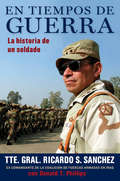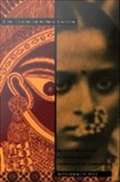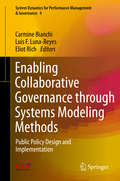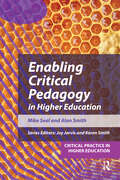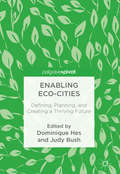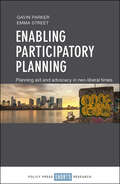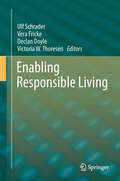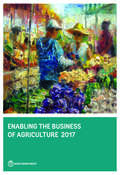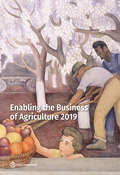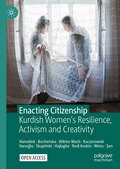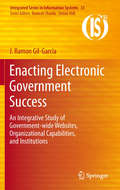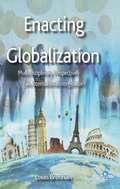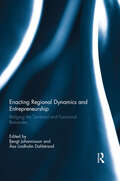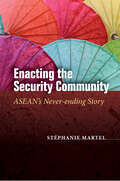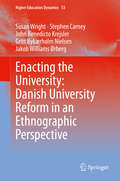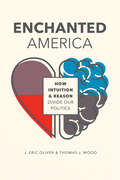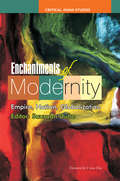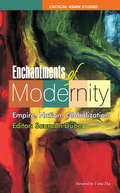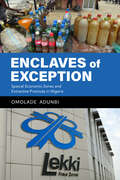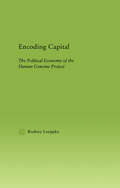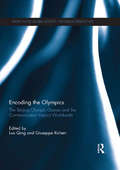- Table View
- List View
En tiempos de guerra
by Ricardo S. SánchezEn medio de las críticas a la guerra de los Estados Unidos en Irak, una voz esencial ha permanecido en silencio. . . hasta ahora En su revolucionaria historia, En tiempos de guerra, el Teniente General Ricardo S. Sanchez, ex comandante de las fuerzas de coalición en Irak, nos trae un informe desde la línea de fuego de la guerra global contra el terrorismo. Aquí nos presenta una investigación exhaustiva y escalofriante de los históricos errores garrafales de los Estados Unidos en materia militar y de política exterior. Basándose en su permanencia en la zona de conflicto, Sanchez nos brinda una franca descripción del caos en el campo de batalla en Irak, producto del desacertado manejo del ejército por parte de la administración de Bush, así como su propia lucha para colocar a la coalición en el camino hacia la victoria. Sanchez saca a la luz las consecuencias de la interrupción en la comunicación entre el mando en el frente de batalla y los políticos en Washington, revelando discusiones polémicas que mantuvo con, entre otros, el Embajador Paul Bremer y el Secretario de Defensa Donald Rumsfeld. Además, Sanchez comparte la historia de su carrera. Cuenta su trayecto desde su juventud pobre a orillas del Río Grande en Texas hasta su incorporación al Cuerpo de Entrenamiento de Oficiales de Reserva a los dieciséis años su posterior servicio en Kosovo, las operaciones Escudo del Desierto y Tormenta del Desierto y, finalmente, Irak. Cuando se retiró, Sanchez era el hispano de mayor rango en el ejército de los Estados Unidos. Como primer libro escrito por un ex-Comandante apostado en Irak, En tiempos de guerra es de lectura obligatoria para todo aquel que desee entender la guerra actual y el rol del ejército de los Estados Unidos en el nuevo siglo.
En-Gendering India: Woman and Nation in Colonial and Postcolonial Narratives
by Sangeeta RayEn-Gendering India offers an innovative interpretation of the role that gender played in defining the Indian state during both the colonial and postcolonial eras. Focusing on both British and Indian literary texts--primarily novels--produced between 1857 and 1947, Sangeeta Ray examines representations of "native" Indian women and shows how these representations were deployed to advance notions of Indian self-rule as well as to defend British imperialism. Through her readings of works by writers including Bankimchandra Chatterjee, Rabindranath Tagore, Harriet Martineau, Flora Annie Steel, Anita Desai, and Bapsi Sidhaa, Ray demonstrates that Indian women were presented as upper class and Hindu, an idealization that paradoxically served the needs of both colonial and nationalist discourses. The Indian nation's goal of self-rule was expected to enable women's full participation in private and public life. On the other hand, British colonial officials rendered themselves the protectors of passive Indian women against their "savage" male countrymen. Ray shows how the native woman thus became a symbol for both an incipient Indian nation and a fading British Empire. In addition, she reveals how the figure of the upper-class Hindu woman created divisions with the nationalist movement itself by underscoring caste, communal, and religious differences within the newly emerging state. As such, Ray's study has important implications for discussions about nationalism, particularly those that address the concepts of identity and nationalism. Building on recent scholarship in feminism and postcolonial studies, En-Gendering India will be of interest to scholars in those fields as well as to specialists in nationalism and nation-building and in Victorian, colonial, and postcolonial literature and culture.
Enabling Collaborative Governance through Systems Modeling Methods: Public Policy Design and Implementation (System Dynamics for Performance Management & Governance #4)
by Luis F. Luna-Reyes Carmine Bianchi Eliot RichThis volume constitutes a first approximation for the use of systems approaches and dynamic performance management as tools for collaborative governance. The chapters examine models and simulations used in some specific systems approaches, which contribute to facilitating problem focus and collective understanding of collaborative governance, especially in the area of performance management. The explicit connection between resources and outcomes promoted by this view helps managers to understand better how to improve policy and to create positive outcomes that create public value.
Enabling Critical Pedagogy in Higher Education (Critical Practice in Higher Education)
by Mike Seal Alan SmithAn introduction to critical pedagogy for all those working within higher education.Critical Pedagogy is an approach that is fundamentally democratic, informal, non-hierarchical, determined by participants, privileges the oppressed and their perspectives and is committed to action. Higher education (HE), conversely, is often un-democratic, formal, hierarchical, determined by tutors and national bodies, re-inscribes existing privileges and is distant from lived experience. The book starts from the premise that critical pedagogies are possible in HE, while recognising the tensions to be ameliorated in trying to enact them. It re-examines the concept and explores its practical application at an institutional level, within the curriculum, within assessment, through learning and teaching and in the spaces in-between. The Critical Practice in Higher Education series provides a scholarly and practical entry point for academics into key areas of higher education practice. Each book in the series explores an individual topic in depth, providing an overview in relation to current thinking and practice, informed by recent research. The series will be of interest to those engaged in the study of higher education, those involved in leading learning and teaching or working in academic development, and individuals seeking to explore particular topics of professional interest. Through critical engagement, this series aims to promote an expanded notion of being an academic – connecting research, teaching, scholarship, community engagement and leadership – while developing confidence and authority.
Enabling Eco-Cities
by Dominique Hes Judy BushCities are striving to become more resilient, adaptive and sustainable; this requires new ways of governing and developing the city. This book features chapters by researchers using regenerative development and transitions theories to envisage how Eco-Cities could be planned, designed and created, and concludes with practical tools and an outline of how this evolution could be facilitated. It examines two major questions: How can we use understandings of Eco-Cities to address the legacy of urban built form and existing practices which often make it difficult to create the systemic changes needed? And what are the elements of complex urban places and spaces that will enable the planning, creation and evolution of thriving cities?The book will appeal to planners, city makers, urban researchers, students and practitioners, including planners, designers, architects and sustainability managers, and all those seeking to envisage the steps along the path to thriving cities of the future.
Enabling Participatory Planning: Planning Aid and Advocacy in Neoliberal Times
by Emma Street Gavin ParkerThis book examines the challenges in delivering a participatory planning agenda in the face of an increasingly neoliberalised planning system and charts the experience of Planning Aid England. In an age of austerity, government spending cuts, privatisation and rising inequalities, the need to support and include the most vulnerable in society is more acute than ever. However, forms of Advocacy Planning, the progressive concept championed for this purpose since the 1960s, is under threat from neoliberalisation. Rather than abandoning advocacy, the book asserts that only through sustained critical engagement will issues of exclusion be positively tackled and addressed. The authors propose neo-advocacy planning as the critical lens through which to effect positive change. This, they argue, will need to draw on a co-production model maintained through a well-resourced special purpose organisation set up to mobilise and resource planning intermediaries whose role it is to activate, support and educate those without the resources to secure such advocacy themselves.
Enabling Responsible Living
by Declan Doyle Ulf Schrader Vera Fricke Victoria W. ThoresenThe book focuses on responsible living as the individual's contribution to sustainable development. We believe that sustainable development can only be achieved if individual freedom and responsibilities are balanced on a high level while taking social, ecological and economic needs into account. A crucial element to achieve this is to integrate different perspectives of stakeholders and co-create a joined approach through partnerships. While partnerships develop new opportunities for the stakeholders involved they also require a readiness for mutual understanding, respect and courage to co-create.
Enabling Urban Alternatives: Crises, Contestation, and Cooperation
by Lee Pugalis Jens Kaae Fisker Letizia Chiappini Antonella BruzzeseThis book asks how thinking, governing, performing, and producing the urban differently can assist in enabling the creation of alternative urban futures. It is a timely response to the ongoing crises and pressing challenges that inhabitants of cities, towns, and villages worldwide are faced with in the midst of what has been widely dubbed as ‘an urban age’. Starting from the premise that current urban development patterns are unsustainable in every sense of the word, the book explores how alternative patterns can be pursued by the wide variety of actors – from governments and international institutions to slum-dwellers and social movements – involved in the on-going production of our shared urban condition. The challenges addressed include exclusion and segregation; persisting poverty and increasing inequality; urban sprawl and changing land use patterns; and the spatial frames of urban policy. As such the book appeals to urban scholars, policy makers, activists, and others concerned with shaping the future of our cities and of urban life in general. Additionally, it is of interest to students in urban planning, architecture and design, human geography, urban sociology, and related fields.
Enabling the Business of Agriculture 2017
by World Bank GroupEnabling the Business of Agriculture 2017, the third report in the series, offers insights into how laws and regulations affect private sector development for agribusinesses, including producer organizations and other agricultural entrepreneurs. Globally comparable data and scored indicators encourage regulations that ensure the safety and quality of agricultural inputs, goods and services but are not too costly or burdensome. The goal is to facilitate the operation of agribusinesses and allow them to thrive in a socially and environmentally responsible way, enabling them to provide essential agricultural inputs and services to farmers that could increase their productivity and profits. Regional, income-group and country-specific trends and data observations are presented for 62 countries and across 12 topics: seed, fertilizer, machinery, finance, markets, transport, water, ICT, land, livestock, environmental sustainability and gender. Data are current as of June 30, 2016. For more information, please see http://eba.worldbank.org
Enabling the Business of Agriculture 2019
by World BankEnabling the Business of Agriculture 2019 presents indicators that measure the laws, regulations and bureaucratic processes that affect farmers in 101 countries. The study covers eight thematic areas: supplying seed, registering fertilizer, securing water, registering machinery, sustaining livestock, protecting plant health, trading food and accessing finance. The report highlights global best performers and countries that made the most significant regulatory improvements in support of farmers.
Enabling the City: Interdisciplinary and Transdisciplinary Encounters in Research and Practice
by Katrin Paadam Josefine Fokdal Olivia Bina Prue Chiles Liis OjamäeEnabling the City is a collaborative book that focuses on how interdisciplinary and transdisciplinary processes of knowledge production may contribute to urban transformation at a local level in the 21st century, striking a balance between enthusiastic support for such transformational potential and a cautious note regarding the persistent challenges to the ethos as well as the practice of inter and transdisciplinarity. The rich stories reflect different research and local practice cultures, exploring issues such as ageing, community, health and dementia, public space, energy, mobility cultures, heritage, housing, re-use, and renewal, as well as more universal questions about urban sustainability and climate change, and perhaps most importantly, education. Against this backdrop, aspirations for the 21st century are related to the international, national, and local agendas expressed in the Sustainable Development Goals (SDGs) and in the New Urban Agenda (NUA), raising fundamental questions of how to enable development. We highlight aspects of transformative learning and ways of knowing, critical to any collaborative and participatory process.
Enacting Citizenship: Kurdish Women's Resilience, Activism and Creativity
by Joanna Bocheńska Nerina Weiss Wendelmoet Hamelink Dobrosława Wiktor-Mach Karol Kaczorowski Hayal Hanoğlu Marcin Skupiński Azad Hajiagha Hüseyin Rodi Keskin Besime ŞenThis open access book presents new, empirically-based ethnographic and sociological studies of Kurdish women’s activism and its implications for their rights and the dynamics of citizenship across different social, cultural, and political fields. Organized into five sections, the book explores the ecological and cultural aspects of citizenship and activism; the interplay between activism and family life; the status of citizens and stateless people in marginalized conditions; and the historical development of Kurdish citizenship in various regions of Kurdistan and the diaspora. It offers an in-depth exploration of lived citizenship, social movements, and women activism in the Global South, as well as a comprehensive study of contemporary Kurdish society, politics, and culture. This book is an essential read for researchers in Kurdish studies, women’s and gender studies, family studies, peace and conflict studies, migration studies, environmental studies, and art and literary studies.
Enacting Electronic Government Success
by J. Ramon Gil-GarciaMany countries around the world are investing a great amount of resources in government IT initiatives. However, few of these projects achieve their stated goals and some of them are complete failures. Therefore, understanding e-government success has become very important and urgent in recent years. In order to develop relevant knowledge about this complex phenomenon, researchers and practitioners need to identify and assess what are the main conditions, variables, or factors that have an impact on e-government success. However, before being able to evaluate these impacts, it is necessary to define what e-government success is and what some e-government success measures are. This book presents a review of both e-government success measures and e-government success factors. It also provides empirical evidence from quantitative analysis and two in-depth case studies. Although based on sound theory and rigorous empirical analysis, the book not only significantly contributes to academic knowledge, but also includes some practical recommendations for government officials and public managers. Theoretically, the book proposes a way to quantitatively operationalize Fountain's enactment framework. Based on the institutional tradition, the technology enactment framework attempts to explain the effects of organizational forms and institutional arrangements on the information technology used by government agencies. According to Fountain (1995; 2001) the technology enactment framework pays attention to the relationships among information technology, organizations, embeddedness, and institutions. This framework is very well known in the e-government field, but is normally used for qualitative analysis and there is no previous proposal of how to use it with quantitative data. The book proposes variables to measure each of the different constructs in this framework and also tests the relationships hypothesized by Fountain's theory. Finally, using the advantages of the selected quantitative analysis technique (Partial Least Squares), the study also proposes some adjustments and extensions to the original framework in a theory building effort. Methodologically, the book reports on one of the first multi-method studies in the field of e-government in general and e-government success in particular. This study uses a nested research design, which combines statistical analysis with two in depth case studies. The study begins with a statistical analysis using organizational, institutional, and contextual factors as the independent variables. An overall score representing e-government success in terms of the functionality of state websites is the dependent variable. Second, based on the statistical results two cases are selected based on their relative fitness to the model (residuals) and their position in the general ranking of website functionality (which includes four different measures). In order to complement the results of the statistical analysis, case studies were developed for the two selected states (New York and Indiana), using semi-structured interviews and document analysis. In terms of the statistical analysis, the book constitutes one of the first applications of Partial Least Squares (PLS) to an e-government success study. PLS is a structural equations modeling (SEM) technique and, therefore, allows estimating the measurement model and the structural model simultaneously. The use of this sophisticated statistical strategy helped to test the relationships between e-government success and different factors influencing it, as well as some of the relationships between several of the factors, thus allowing exploring some indirect effects too.
Enacting European Citizenship
by Engin F. Isin Michael SawardWhat does it mean to be a European citizen? The rapidly changing politics of citizenship in the face of migration, diversity, heightened concerns about security and financial and economic crises, has left European citizenship as one of the major political and social challenges to European integration. Enacting European Citizenship develops a distinctive perspective on European citizenship and its impact on European integration by focusing on 'acts' of European citizenship. The authors examine a broad range of cases - including those of the Roma, Sinti, Kurds, sex workers, youth and other 'minorities' or marginalised peoples - to illuminate the ways in which the institutions and practices of European citizenship can hinder as well as enable claims for justice, rights and equality. This book draws the key themes together to explore what the limitations and possibilities of European citizenship might be.
Enacting Globalization
by Louis BrennanEnacting Globalization consists of a rich set of papers with a variety of disciplinary perspectives, focusing on Globalization and its portrayal through International Integration as manifested by its myriad flows such as people, trade, capital and knowledge flows.
Enacting Moral Education in Japan: Between State Policy and School Practice (Routledge Series on Schools and Schooling in Asia)
by Sam BamkinDrawing on the case of moral education reform, this book provides an authoritative picture of how policy is enacted between state policymaking and school practice in Japan, focusing on how national policy is enacted locally in the classroom. The study follows the 2015 moral education reform from its genesis in central government, through the Ministry of Education to its enactment by local government and schools. The book looks beyond written policies, curricula and textbooks to examine how teachers, school administrators and others make sense of, and translate, policy into practice in the Japanese classroom context. Chapters explore how moral education practice has changed in response to the intentions of national policy, and analyzes the implications for understanding processes of policy enactment in the Japanese education system. This book presents a new perspective on the complexity of education policy making, practice, and the gaps in between. It will be of interest to postgraduate students, researchers, and academics in the fields of education policy and politics, moral education, school administration, and international and comparative education more broadly, particularly in Asia.
Enacting Regional Dynamics and Entrepreneurship: Bridging The Territorial And Functional Rationales
by Bengt Johannisson Åsa Lindholm DahlstrandIn present digital times the focus is on globalization and the dynamics and complexities that it creates. However, in spite of being dominated by technology the world remains populated by human beings practising a localized everyday life. This contrast should challenge every researcher who is concerned with business and societal development and how that is contingent upon the institutional and cultural (national) context. In this book, Swedish researchers reflect upon entrepreneurship as a possible mediator between local and global economic and social concerns. Using as a point of departure the tensions between a functional, footloose rationale and a territorial rationale tied to place, the authors provide different aspects on regional development in a globalised world. A shared concern is the importance of recognizing the many appearances of entrepreneurship that brings it beyond being an innovative force in the market. The book thus presents different strategies and tactics for pursuing localized economic development and it also critically reviews adopted public support programmes and measures of the (local) business climate. The conclusive message is that only by bridging the functional and territorial views will it be possible to sustain, and possibly enhance, economic and social life in local places as well as in our shared world. This book was originally published as a special issue of European Planning Studies.
Enacting the Security Community: ASEAN's Never-ending Story (Studies in Asian Security)
by Stéphanie MartelEnacting the Security Community illuminates the central role of discourse in the making of security communities through a case study of the Association of Southeast Asian Nations (ASEAN). Despite decades of discussion, scholars of political science and international relations have long struggled to identify what kind of security community ASEAN is striving to become. Talk about security, Stéphanie Martel argues in this innovative study, is more than empty rhetoric. It is precisely through discourse that ASEAN is brought into being as a security community. Martel analyzes the epic narratives that state and non-state actors tell about ASEAN's journey to becoming a security community, featuring a colorful cast of heroes and monsters. Chapters address a wide spectrum of current regional security concerns, from the South China Sea disputes to the Rohingya crisis, and nontraditional challenges like natural disasters and pandemics. Through fieldwork and in-depth interviews with practitioners, Martel provides clear evidence that discourse is key to sustaining regional organizations like ASEAN. Enacting the Security Community is an incisive contribution to debates among scholars and practitioners about security communities as well as the role of discourse in the study of world politics, and essential reading for students of Southeast Asian international relations, politics, and security.
Enacting the University: Danish University Reform in an Ethnographic Perspective (Higher Education Dynamics #53)
by Susan Wright Stephen Carney John Benedicto Krejsler Gritt Bykærholm Nielsen Jakob Williams ØrbergThis book examines the transformative power and the limitations of one of Europe’s most significant university reforms from an ethnographic and historical perspective. It incorporates voices positioned across university and policy-making hierarchies in its analysis of how Danish universities have been transformed. To do this, the book continually juxtaposes two meanings of ‘enactment’: a top-down view based on laws and institutional power, and a bottom-up view of multiple actors shaping their institution in day-to-day life and in actively contested changes. By conceiving of the university as ‘enacted’ in both ways at once, the book explores how and why the university comes to be imagined and instantiated in new ways. The book traces the arguments for reform through a two-decade long, dynamic struggle between international forums and national industrial, political and academic interests over the definition of the university. It discusses which ideas finally became dominant and how this happened. It looks at government reforms from 2003 onwards, and, by means of notable ‘telling moments’, explains how the governance and management of the university were transformed. It examines how academics found room to manoeuvre between contesting discourses that affect their identity and work. Finally, it shows how students engaged with new versions of historical debates about their participation in shaping their own education, their institution and society.
Enchanted America: How Intuition and Reason Divide Our Politics
by J. Eric Oliver Thomas J. WoodAmerica is in civic chaos, its politics rife with conspiracy theories and false information. Nationalism and authoritarianism are on the rise, while scientists, universities, and news organizations are viewed with increasing mistrust. Its citizens reject scientific evidence on climate change and vaccinations while embracing myths of impending apocalypse. And then there is Donald Trump, a presidential candidate who won the support of millions of conservative Christians despite having no moral or political convictions. What is going on? The answer, according to J. Eric Oliver and Thomas J. Wood, can be found in the most important force shaping American politics today: human intuition. Much of what seems to be irrational in American politics arises from the growing divide in how its citizens make sense of the world. On one side are rationalists. They use science and reason to understand reality. On the other side are intuitionists. They rely on gut feelings and instincts as their guide to the world. Intuitionists believe in ghosts and End Times prophecies. They embrace conspiracy theories, disbelieve experts, and distrust the media. They are stridently nationalistic and deeply authoritarian in their outlook. And they are the most enthusiastic supporters of Donald Trump. The primary reason why Trump captured the presidency was that he spoke about politics in a way that resonated with how Intuitionists perceive the world. The Intuitionist divide has also become a threat to the American way of life. A generation ago, intuitionists were dispersed across the political spectrum, when most Americans believed in both God and science. Today, intuitionism is ideologically tilted toward the political right. Modern conservatism has become an Intuitionist movement, defined by conspiracy theories, strident nationalism, and hostility to basic civic norms. Enchanted America is a clarion call to rationalists of all political persuasions to reach beyond the minority and speak to intuitionists in a way they understand. The values and principles that define American democracy are at stake.
Enchantments of Modernity: Empire, Nation, Globalization (Critical Asian Studies)
by Saurabh DubeThe notion of modernity hinges on a break with the past, such as superstitions, medieval worlds, and hierarchical traditions. It follows that modernity suggests the disenchantment of the world, yet the processes of modernity also create their own enchantments in the mapping and making of the modern world. Straddling a range of disciplines and perspectives, the essays in this edited volume eschew programmatic solutions, focusing instead in new ways on subjects of slavery and memory, global transformations and vernacular and vernacular modernity, imperial imperatives and nationalist knowledge, cosmopolitan politics and liberal democracy, and governmental effects and everyday affects. It is in these ways that the volume attempts to unravel the enchantments of modernity, in order to approach anew modernity's constitutive terms, formative limits, and particular possibilities.
Enchantments of Modernity: Empire, Nation, Globalization (Critical Asian Studies)
by Saurabh DubeThe notion of modernity hinges on a break with the past, such as superstitions, medieval worlds, and hierarchical traditions. It follows that modernity suggests the disenchantment of the world, yet the processes of modernity also create their own enchantments in the mapping and making of the modern world. Straddling a range of disciplines and perspectives, the essays in this edited volume eschew programmatic solutions, focusing instead in new ways on subjects of slavery and memory, global transformations and vernacular and vernacular modernity, imperial imperatives and nationalist knowledge, cosmopolitan politics and liberal democracy, and governmental effects and everyday affects. It is in these ways that the volume attempts to unravel the enchantments of modernity, in order to approach anew modernity's constitutive terms, formative limits, and particular possibilities.
Enclaves of Exception: Special Economic Zones and Extractive Practices in Nigeria
by Omolade AdunbiHow do we measure and truly grasp the sweeping social and environmental effects of an oil-based economy? Focusing on the special economic zones resulting from China's trading partnership with Nigeria, Enclaves of Exception offers a new approach to exploring the relationship between oil and technologies of extraction and their interrelatedness to local livelihoods and environmental practices. In this groundbreaking work, Omolade Adunbi argues that even though the exploitation of oil resources is dominated by big corporations, it establishes opportunities for many former Nigerian insurgents and their local communities to contest the ownership of such resources in the oil-rich Niger Delta and to extract oil themselves and sell it.Based on extensive ethnographic fieldwork, Enclaves of Exception makes clear that, although both the free trade zones and the now booming local artisanal refineries share the goals of profit-making and are enthusiastically supported by those benefiting from them economically, they have yielded dramatically the same environmental outcome for communities around them that included pollution with precarious effects on the health of the populations in the regions, and displacement of population from their livelihood practices.
Encoding Capital: The Political Economy of the Human Genome Project (New Political Economy)
by Rodney LoeppkyFirst Published in 2005. Routledge is an imprint of Taylor & Francis, an informa company.
Encoding the Olympics: The Beijing Olympic Games and the Communication Impact Worldwide (Sport in the Global Society - Historical Perspectives)
by Luo Qing Giuseppe RicheriEncoding the Olympics assembles a uniquely representative international team of media experts to provide a comprehensive review of the global impact of media and cultural communications associated with the Beijing 2008 Olympics. Commissioned by the IOC, this pioneering comparative study – the largest in Olympic Games research –provides a ground-breaking, panoramic, cross-cultural perspective on media responses to the leading sports event of the modern world. The representative team that undertook the study includes media commentators and political analysts, sport and media journalists, Sinologists and observers of the Asian Pacific Rim, academics in Olympic Studies and media and communication studies, scholars of the cultural and sociology studies of sport and festival and events managers. Encoding the Olympics provides a unique, encyclopaedic study that will serve as a versatile resource at several levels – as a textbook or source reference for academic institutions, media public relations agencies that facilitate the work of inter-cultural exchange organisations, and international communication departments of multinational enterprises and international NGOs. This volume analyses global media responses to a mega-sport event on a scale never before attempted. This book was previously published as a special issue of the International Journal of the History of Sport.
